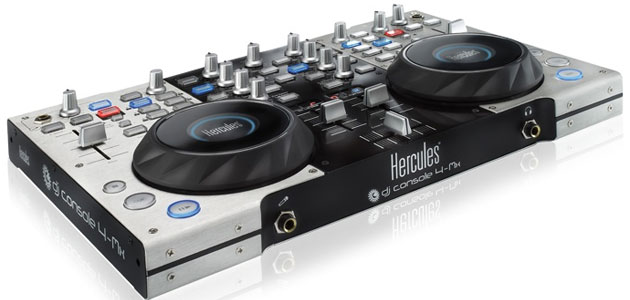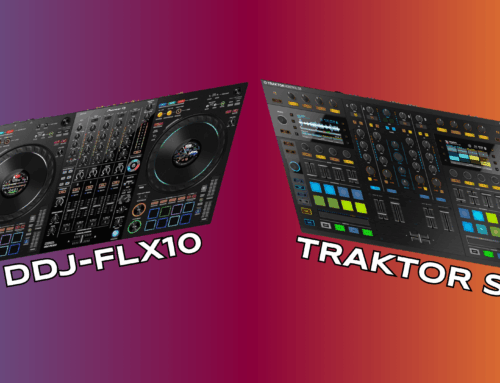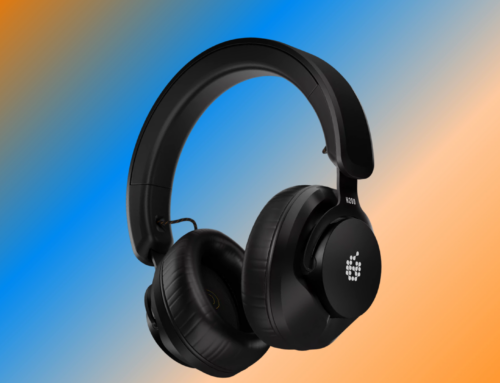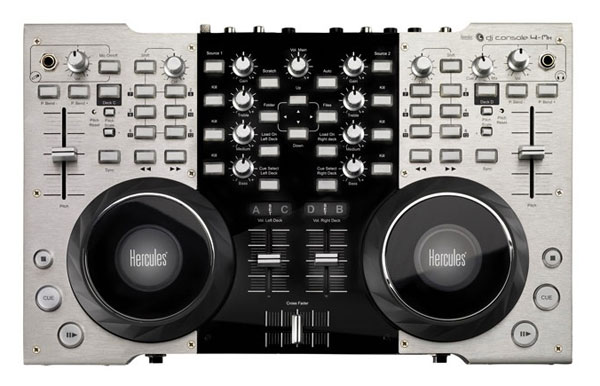 The DJ Console 4-Mx, one of Hercules’ latest entries into the world of 4-deck mixer/controller/soundcards, is a mid-sized metal mixing machine with enough buttons, knobs, and special features to provide formidable competition for most controllers on the market today. Weighing in at seven pounds, the portability, functionality, and modern styling of the 4-Mx make it a great choice for the frat party rocker or the DJ-on-the-go.
The DJ Console 4-Mx, one of Hercules’ latest entries into the world of 4-deck mixer/controller/soundcards, is a mid-sized metal mixing machine with enough buttons, knobs, and special features to provide formidable competition for most controllers on the market today. Weighing in at seven pounds, the portability, functionality, and modern styling of the 4-Mx make it a great choice for the frat party rocker or the DJ-on-the-go.
The black and silver metal casing of the 4-Mx, combined with its array of bright blue LEDs, give the controller a sleek, edgy, modern appeal as well as durability and a solid design. The heavy-duty-looking ¼-inch TRS jacks are also a nice touch. While this unit is perhaps not as hefty or rugged as a thousand-dollar Pioneer or Allen & Heath unit, it’s certainly more substantial than something like the Vestax Typhoon or a Numark Mixtrack Pro. The 4-Mx also comes with an included gig bag, which makes it the perfect carry-on for long trans-Atlantic flights (or walking to your buddy’s house party).
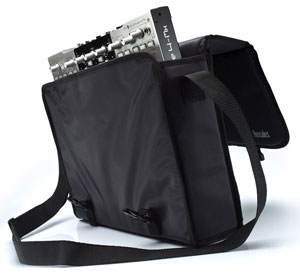
Hercules DJ Console 4-Mx Gig Bag
As a MIDI controller, the 4-Mx provides all the functionality you’d expect from its class – jog wheels, hotcue triggers, playback control, EQ (with EQ kill toggles), and faders for both tempo and channel gain. Because this mixer is designed to handle four decks, there is also a deck switch button on each side. Additionally, the 4-Mx has 6 buttons and a control knob on each side to create and modify cue points, effects, loops, and more. However, the fact that only those 6 buttons are explicitly available for this wide variety of functions makes finding the right button to press difficult, as these buttons are labeled only with numbers, and their mappings are rather arbitrary, in my opinion. In particular, I found triggering effects and modifying their parameters to be somewhat difficult in both Virtual DJ and Traktor, which is unfortunate because I am a bit of an FX junkie.
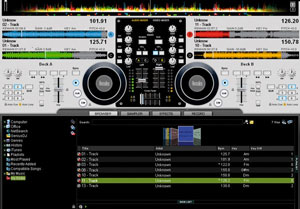 Another feature that bothered me was the built-in file browser controls. While this functionality is certainly welcome, I found its implementation and location to be awkward on this unit. My fingers didn’t agree with what the 4-Mx wanted them to do, and I ended up using my laptop’s keyboard far more than the on-deck buttons to look through files. Despite these few control hiccups, one really cool feature that I was surprised to encounter is the pitch scale function, which lets you adjust how much of an impact the tempo fader has on the song’s speed. Additionally, I was really pleased with the jog wheels, which are pressure-sensitive and have quite a smooth glide. However, despite their glide the wheels themselves are as wobbly as a dubstep bassline, which is unsettling when you’re looking for tight tactile control.
Another feature that bothered me was the built-in file browser controls. While this functionality is certainly welcome, I found its implementation and location to be awkward on this unit. My fingers didn’t agree with what the 4-Mx wanted them to do, and I ended up using my laptop’s keyboard far more than the on-deck buttons to look through files. Despite these few control hiccups, one really cool feature that I was surprised to encounter is the pitch scale function, which lets you adjust how much of an impact the tempo fader has on the song’s speed. Additionally, I was really pleased with the jog wheels, which are pressure-sensitive and have quite a smooth glide. However, despite their glide the wheels themselves are as wobbly as a dubstep bassline, which is unsettling when you’re looking for tight tactile control.
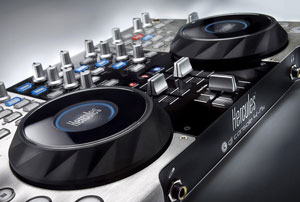 As a USB sound card, the 4-Mx also has plenty to bring to the table. On the back of the mixer, there are two sets of RCA input jacks and a ground, enabling you to use any number of external sound sources in your mix. I found the implementation of this function in Traktor to be pleasantly smooth and simple, using the “Source” button on each side. The mixer also has two sets of RCA stereo outputs as well as four ¼-inch mono TRS outputs, two per channel. The second channel is likely designed as a booth channel, though the audio flow can be configured however you want. Confusingly, the 4-Mx provides ¼-inch mic and cueing jacks on both the front and top face of the mixer, though each location provides sound from the same channel. The included software and driver are also smooth and intuitive to use, and I was really impressed with the number of options and configurations allowed by the controller’s software.
As a USB sound card, the 4-Mx also has plenty to bring to the table. On the back of the mixer, there are two sets of RCA input jacks and a ground, enabling you to use any number of external sound sources in your mix. I found the implementation of this function in Traktor to be pleasantly smooth and simple, using the “Source” button on each side. The mixer also has two sets of RCA stereo outputs as well as four ¼-inch mono TRS outputs, two per channel. The second channel is likely designed as a booth channel, though the audio flow can be configured however you want. Confusingly, the 4-Mx provides ¼-inch mic and cueing jacks on both the front and top face of the mixer, though each location provides sound from the same channel. The included software and driver are also smooth and intuitive to use, and I was really impressed with the number of options and configurations allowed by the controller’s software.


Hercules’s DJ Console 4-Mx seems like a really solid choice for anyone from bedroom DJ’s to those looking to spin for house parties and small clubs. In fact, it may be one of the most functional “entry-level” controllers out there, though its price point may disagree with that label. However, as difficult a time I had with some of the awkwardly placed controls and strange design elements, that may just be the upper limit of its functionality. Though the 4-Mx covers many of the DJ basics, and covers them well, users might find themselves constantly wishing they had the funds to upgrade to a Traktor Kontrol S4 or Numark NS6 – a problem I haven’t had with some other similarly priced mixer/controllers. That said, the 4-Mx is still plenty powerful, and some of the things that bothered me might not bother someone who hasn’t played with more functional (and much more expensive) flagship beasts of the industry. I would say it’s certainly worth a try, especially if you’re upgrading from something like the Hercules DJ Control MP3 e2. If you’re considering trading in your multi-thousand-dollar Pioneer, however, you might want to hang on to it for a while.
